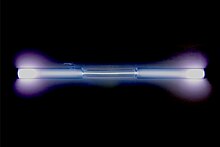Xenon, 54Xe |
| Xenon |
|---|
| Pronunciation | |
|---|
| Appearance | colourless gas, exhibitin a blue glow when placed in a heich voltage electric field |
|---|
| Standard atomic weight Ar, std(Xe) | 7002131293000000000♠131.293(6)[3] |
|---|
| Xenon in the periodic cairt |
|---|
|
|
| Atomic nummer (Z) | 54 |
|---|
| Group | group 18 (noble gases) |
|---|
| Period | period 5 |
|---|
| Block | p-block |
|---|
| Element category | Noble gas |
|---|
| Electron confeeguration | [Kr] 4d10 5s2 5p6 |
|---|
| Electrons per shell | 2, 8, 18, 18, 8 |
|---|
| Pheesical properties |
|---|
| Phase at STP | gas |
|---|
| Meltin pynt | 161.40 K (-111.75 °C, -169.15 °F) |
|---|
| Bylin pynt | 165.051 K (-108.099 °C, -162.578 °F) |
|---|
| Density (at STP) | 5.894 g/L |
|---|
| whan liquid (at b.p.) | 3.057[4] g/cm3 |
|---|
| Treeple pynt | 161.405 K, 81.77[5] kPa |
|---|
| Creetical pynt | 289.733 K, 5.842[5] MPa |
|---|
| Heat o fusion | 2.27 kJ/mol |
|---|
| Heat o vapourisation | 12.64 kJ/mol |
|---|
| Molar heat capacity | 5R/2 = 20.786 J/(mol·K) |
|---|
Vapour pressur
| P (Pa)
|
1
|
10
|
100
|
1 k
|
10 k
|
100 k
|
| at T (K)
|
83
|
92
|
103
|
117
|
137
|
165
|
|
| Atomic properties |
|---|
| Oxidation states | 0, +1, +2, +4, +6, +8 rarely non-0, waikly acidic |
|---|
| Electronegativity | Pauling scale: 2.6 |
|---|
| Covalent radius | 140±9 pm |
|---|
| Van der Waals radius | 216 pm |
|---|
 Colour lines in a spectral rangeSpectral lines o xenon Colour lines in a spectral rangeSpectral lines o xenon |
| Ither properties |
|---|
| Naitural occurrence | primordial |
|---|
| Creestal structur | face-centred cubic (fcc) |
|---|
| Speed o soond | (liquid) 1090 m/s; (gas) 169 m/s |
|---|
| Thermal conductivity | 5.65×10-3 W/(m·K) |
|---|
| Magnetic orderin | diamagnetic[6] |
|---|
| CAS Nummer | 7440-63-3 |
|---|
| History |
|---|
| Diskivery | William Ramsay an Morris Travers (1898) |
|---|
| First isolation | William Ramsay an Morris Travers (1898) |
|---|
| Main isotopes o xenon |
|---|
|
|
| Decay modes in parentheses are predictit, but hae nae yet been observed |
| | references |
| style="text-align:left"|
|
|
|
in
|
calc from C
|
diff
|
report
|
ref
|
| C
|
| —
|
—
|
|
|
| K
|
161.40
|
161.40
|
0
|
|
|
| F
|
-169.15
|
−169.15
|
0
|
|
|
| WD
|
String Module Error: Target string is empty ! 
|
|
|
|
| input
|
C: -111.75, K: 161.40, F: -169.15
|
| comment
|
|
| style="text-align:left"|
|
|
|
in
|
calc from C
|
diff
|
report
|
ref
|
| C
|
| —
|
—
|
|
|
| K
|
165.051
|
165.051
|
0
|
|
|
| F
|
-162.578
|
−162.578
|
0
|
|
|
| WD
|
String Module Error: Target string is empty ! 
|
|
|
|
| input
|
C: -108.099, K: 165.051, F: -162.578
|
| comment
|
|
References
Thir references will appear in the airticle, but this list appears anerly on this page.
- ↑ Simpson, J. A.; Weiner, E. S. C., eds. (1989). "Xenon". Oxford English Dictionary. 20 (2nd ed.). Clarendon Press. ISBN 0-19-861232-X.
- ↑ "Xenon". Dictionary.com Unabridged. 2010. Retrieved 6 Mey 2010.
- ↑ Meija, Juris; et al. (2016). "Atomic weights of the elements 2013 (IUPAC Technical Report)". Pure and Applied Chemistry. 88 (3): 265–91. doi:10.1515/pac-2015-0305.
- ↑
"Krypton". Gas Encyclopedia. Air Liquide. 2009.
- ↑ a b Haynes, William M., ed. (2011). CRC Handbook of Chemistry and Physics (92nt ed.). CRC Press. p. 4.123. ISBN 1439855110.
- ↑ Magnetic susceptibility of the elements and inorganic compounds, in Lide, D. R., ed. (2005). CRC Handbook of Chemistry and Physics (86th ed.). Boca Raton (FL): CRC Press. ISBN 0-8493-0486-5.
- ↑
Ackerman, N.; et al. (2011). "Observation of Two-Neutrino Double-Beta Decay in 136Xe with the EXO-200 Detector". Physical Review Letters. 107 (21): 212501. arXiv:1108.4193. Bibcode:2011PhRvL.107u2501A. doi:10.1103/PhysRevLett.107.212501.


